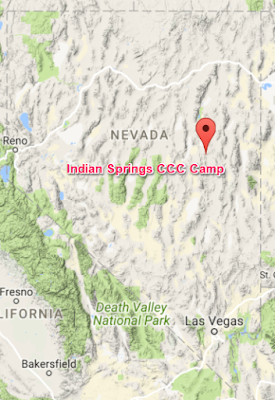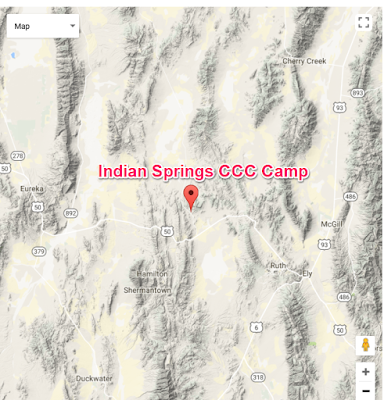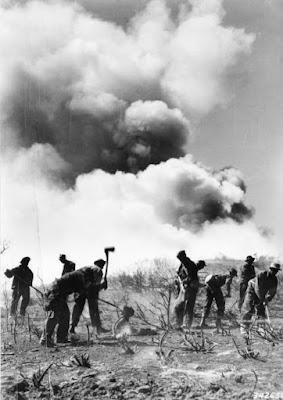 |
| Don B Snyder |
This is Part 3 of a 13-part blog series sharing my Grand-uncle Don’s life story, in his own words, via an autobiography sent to me by Don’s grandson, Ron Oldfield, after Ron stumbled across one of my prior posts about his grandfather. It is shared with the permission of both of Don’s children and Ron Oldfield. [Note – Anything in brackets with green type is my added explanation of something in Don’s text.]
Don’s story:
Part 3 - CIVILIAN CONSERVATION CORPS
[In this entry he speaks of three different CCC Camps he worked at: Camp Indian Springs in the Nevadan desert, Camp Tulelake at the then-newly-opened Lava Beds National Park in California, and Camp Prairie Creek at Prairie Creek Redwoods State Park near Orick, California. He intertwines talking about them quite a bit but I tried to make it clear which Camp he was talking about when I could.]
 |
| Rudolph Wendelin CCC Art, Library and Archives, Forest History Society, Durham, NC, USA Click to make bigger |
There are probably just a few people alive today that knew what the Civilian Conservation Corps was. Thousands of men couldn’t find jobs, so FDR [President Franklin Delano Roosevelt] came up with the PWA, Public Works Administration [in 1933]. The government sponsored it and the men got enough work to live on. It was a life saver. They worked fixing up parks, building roads, and in Findlay [Ohio] they straightened out the river that always overflowed. Now! If the men couldn’t find jobs, what about the older kids? He put thousands of them in camps all over the country. They worked in parks, built roads, etc. The main camp I went to was in Nevada about 40 miles west of Ely. There was a big barren valley about one hundred miles north and south, and about 30 miles east and west with mountains on both sides. The Lincoln Highway crossed it east and west. Our camp, Indian Springs, was seven miles off the highway, as that was the only place they could drill for water.
 |
| Map 1 of site of Camp Indian Springs CCC Camp in Nevada Click to make bigger |
 |
| Map 2 of site of Camp Indian Springs CCC Camp in Nevada Click to make bigger |
This was mostly desert-like. No trees, just sand, sagebrush, lizards, horned toads, etc. I don’t remember seeing coyotes, but I did come across a dead one in a trap. I did come across some rattlesnakes. A couple of guys went with me into some hills back of our camp. There you could look miles out with nothing but barren ground, alkali, and some sagebrush. Going back to camp we took a shortcut down a cliff. There were outcroppings of rock, so it wasn’t so bad. Some broken rocks were in a small crevice. I started to put my foot on a rock and I heard a buzzing kind of like a bee or rattle. Then I saw two rattlesnakes. I pulled a rock loose and hit both of them, killing them. As I reached down and threw them out I heard another rattler about a foot from my hand. It hadn’t been touched. I threw another rock and killed it too. I don’t know why it didn’t bite me. If it had, I’d have had a rough walk to camp.
Johnny Allen was a kid who lived down the street [in Findlay, Ohio]. He lived with his father, an alcoholic, and his mother, a nice lady, and three sisters. He wasn’t cocky, but easy going. A tough kid, I saw him fall off a railroad car on a rail and barely whimpered. Anyways, I’m sorry to say he grew up and really didn’t amount to much. He’d get off work on Saturday night, get real drunk and often spent the night in jail. During WWII he was drafted and was put in our battalion which was composed of a lot of local Findlay men inducted into the United States Army. Some months later I was transferred into the 38th Infantry Division from Indiana, where I was the platoon sergeant of an anti-tank platoon that was new in each battalion. I never heard of him till WWII was over. I had heard that he volunteered to be with the noted Merrill's Marauders in Burma. They had fought all the way to China. Some years passed by and I met him in Findlay, still in uniform, a master sergeant. I said, “what are you doing in uniform?” He replied that he had stayed in the service. I said,“were you in Korea?” He said yes. I said, “you aren’t going back, are you? You don’t have to.” He said yes, so I said, “Johnny, you might get killed this time.” He replied, “so.” Well, he went back and he got killed. I saw in the paper he was the highest serviceman in Findlay that they ever had. The Distinguished Service Cross, that’s next to the Congressional Medal of Honor, plus two Silver Stars, and several Bronze Stars, plus several Purple Hearts. Now that’s a real hero. He is buried in Findlay and each time I’m there, I stop and pay my respects.
I wanted to relate to Johnny going into the 3-C’s. This was his second time as it was with me, but we didn’t want to wait a year as was required so we had to change our names. He kept his name and when we were waiting in line, I said “Johnny, I don’t know what name to use.” He said “Walter Leroy Snyder.” I did and made it. A major that had been in a previous camp recognized him and cheerfully said “hello Johnny,” then looked at the sheet and said, “this isn’t you.” Well, Walter Leroy Snyder went to the Lava Beds National Park [in California] and Johnny had to stay home.
 |
| CCC new recruits at Camp Tulelake, Lava Beds National Park (in public domain) Click to make bigger |
My name change gave me some problems. Someone would say “hey Walt.” I wouldn’t reply and when they yelled it again I’d wake up and reply. Our first sergeant was a little older, bigger, and a nice quiet guy. One time at mail call he called out “Don Snyder” with a surprised look, and said, “we don’t have a Don Snyder here.” I reached up and said, “give me that,” and I pulled it out of his hand. He gave me a long questionable look but didn’t say anything. I figured he had an idea about me, but we were from all over, and from all walks of life. Sometimes things are better left unsaid. I read years later that one can change their last name, but shouldn’t change the first. That made a believer out of me. We had a number of men from the hills. Several couldn’t read or write, but when it came to playing dice they were really sharp on the odds of betting. All in all, it was really good on us teenagers. As to the CCC life, it was good. We worked hard, got three meals a day, WWI army clothes, and $5 a month for you, and $25 sent home which most people saved for us.
We had guys from the cities, the farms, and a lot from Kentucky. You learned how to get along. I remember a guy from the city got caught trying to cheat at cards. They ran him upstairs between two beds and he pulled a knife out. I saw it, but don’t think there was any violence. One time at night some guys were in front of the barracks playing cards. They heard some moaning and went back to the stove and a guy 6’ 7” tall was moaning on the floor. His scalp was ripped open back a ways. No one knew what happened. Well, they took him to the infirmary and the doctor kept giving him a lot of shots kill the pain. Eventually, the truth came out. He and another kid, not big, were playing cards on the floor by the stove. The smaller guy accused him of cheating. He hit the kid and almost knocked him out. They were both from the hills. Maybe they settled things that way. The kid got up, grabbed a stove poker, and let him have it. I think there is a lesson to be had from that. They sent them both home. One time in Nevada, riding a truck to work, a guy (bigger) hit the smaller kid beside me. I said, “cut it out.” He turned at hit me on the shoulder. I hauled off and almost kicked him off his seat. I never saw him do anything to anybody after that. These guys are bullies. Stand up to them and they won’t fight.
Just a few things of no importance. Once, we had a short skinny guy named Pappy Dejernot. He would drink anything alcoholic, including vanilla and lemon extract. Once, I was looking out our barracks door and the door slammed open and he was standing in the door. He stepped down two steps, made a circle, banged up against the outside wall, fell down and passed out. Lemon extract. Another time a kid in the front end of the barracks had been drinking this cheap muscatel wine. He passed out in his bed and vomited all over himself. Guys were playing cards close by, couldn’t stand the smell, so a couple picked up his bed, blankets, and him. Took it out of the barracks and set it down in the rain. When it rains in the redwoods it pours and he never moved.
I’m getting a little ahead of my story. In the Nevada desert there was little to do, so if you had a few bucks you would go to town. I’d go to a movie, have some ice cream, and gamble a few nickels in the nickel slot machines. They paid off a little. You could play a bit, course you would lose in the end. This was cattle and mining country and I’d see some ranchers with big stacks of money there. Later I’d go up to High street and talk to the friendly ladies. They each had a room with a door window. They were all alike. About the only thing in it was a bed and a chair. The rooms were all connected down the street. They would sit by the open window and try to coax you in. One older woman tried to pull a couple guys through. They wanted three bucks and no one would pay that. I guess in the evenings they were busy with the cowboys and miners. I wondered why these pretty girls would work there. Someone said it was because they went to Hollywood and didn’t make it. I don’t know if it’s true, but it’s possible.
We would occasionally have a movie in the mess hall. Occasionally a few cowboys would come in, stand in the back and watch. These were not your drug store movie well-dressed cowboys. I’ve seen them each heading a herd of steers to lord knows where and bring them back in the evening. They were polite, didn’t talk and looked as they say, “one tough hombre.”
Our camps were run by the army. A captain in charge and a first lieutenant executive officer, plus an army doctor second lieutenant. We had army barracks, army clothes, etc. Also had a first sergeant (not army). The man in charge of each platoon was called a leader. We worked for the Division of Grazing building roads. In building our road across the desert [at Indian Spring Camp in Nevada], a survey crew would stake out the road with markers, then in ‘crews’ we peons would grub up the sagebrush with heavy mattocks; we would hit the sand just ahead of the sagebrush with a heavy mattock, then we would lift it up, snapping the root. Others would pile and burn it. Then trucks would bring in and drop gravel, and a grader would level it. The road headed south from Route 50, Lincoln Highway. No one knew where it went, but we were told it would go between two peaks you could see 90 miles away. Some years ago I saw a detailed map and saw a little red line going south and figured that might be it.
In the lava beds of California, we did the same. The Modoc Indians had lived there and there was a Modoc Indian war. I don’t know who won, but I assume we did. However, there is a monument for General or Colonel Canby, who was burned at the stake. [Gen. ED. R.S. Canby was assassinated during peace talks with the tribe (but was not burned at the stake). One of the principal military encampments of the Modoc War of 1872-73 became the center of Camp Tulelake, the base for the CCC crews who worked on the Lava Beds National Park.]
 |
| CCC work to control the Malibu fire near Angeles National Forest, California, in 1935 (US Forest Service, in the public domain) Click to make bigger |
Later we transferred to Camp Prairie Creek in the Redwoods of California on Highway 101. We were in the mountains just south of Crescent City. We went out fighting the fires as soon as we got there. I might add we mostly controlled the fires, but it took the fall rains to put the fires out. After that we split rails, posts, etc., to better the place. [HERE is a 1-minute video of CCC clearing debris and making signs at Camp Prairie Redwoods State Park. ]
The ocean was only about a mile away [from Camp Prairie Creek] and I liked to go there. The water was cold and few of us got in it. I had a very bad experience there. At lunch-time three of us went down to the water. Going back, one of us mentioned going up this steep grade. One didn’t go, but a guy from Ashtabula and I did. It got steeper and steeper. Then it was too late. We couldn’t see down. We would take hold of little rocks sticking out. Often they would crumble. Some didn’t, but if it did and you had weight on you would probably go crashing down. We were nearing the top, hoping we wouldn’t go crashing down on the big rocks below. An outcropping of rock separated us and I couldn’t see him. Well, real slow we made it. I saw his head coming out at the same time as me. His face was red and he was breathing heavy. I suppose I was, too. He looked at me, hesitated, and said, “I prayed.” I said, “me too.” Since then I’ve thought “what if the top curved out?” That probably would have been the end of us. Funny thing I’ve had several close calls besides that some years later. I liked it there but my time was up after six months and [I] went home.
After I got back [home to Findlay, Ohio] I caddied at the country club. The river had a big bend with two holes that crossed it. That meant they had to cross the river four times. You couldn’t hardly get a job then so another friend and I swan the river at the country club for golf balls. The water got to eight feet deep in the middle. The club gave us two cents per ball we turned in. Lots of members had their names on them. We knew them and would give them the balls with their names. Then they would usually give us ten cents or 25 cents per ball. Then women usually had floaters. For that, we got a nickel each. Once, some women were crossing the river and one ball splashed in. I didn’t move. A guy there said, “Aren’t you going to get in?” I still didn’t move. Why? I knew she would hit two or three in the water and I’d get them all at once. The pay was not much but was better than caddying. Besides, the club wanted us to keep the other kids out, which we did.
One day my brother-in-law came out and took me out to the Cooper Tire where he worked. The waiting room was usually full of men hoping someone might quit or get fired. In a depression like that you get desperate for a job. I was interviewed, first told no, then yes. In the two previous days, they had worked two men one day each and fired both of them. I worked like a dog and was surprised when the foremen told me to come back the next day. I did and stayed with them thirteen years including the five years I spent in the army. I later became secretary, chief steward, and president of the local union. I liked negotiating contracts, wages, etc. with the president of the company and his staff.
Other Related Posts (links):
![A Mattock Climbing My Family Tree: A mattock [By Stemonitis (Own work) [CC BY-SA 3.0 (https://creativecommons.org/licenses/by-sa/3.0) or GFDL (http://www.gnu.org/copyleft/fdl.html)], via Wikimedia Commons]](https://blogger.googleusercontent.com/img/b/R29vZ2xl/AVvXsEgeGtLjHYuDBj6PVrmbxP5LlFFV7-s54qUF-AhdbUm4KSHVP2uNfvr_EIshkemT7sSyu50NwWRPqNIsxfS7696qwGpzL9Rlfsoo2T5mf7vQziwkPpFL67w5ThcwLlw3I_YNPa6mhpNbqdo/s400/Cutter_mattock.jpg)
No comments:
Post a Comment
Hello! Thanks for stopping by and choosing to leave a message. I read every message and I usually reply via the comment thread. [I recently discovered that I've been having technical difficulties with receiving notification of comments for the last year (2019 through Jan 2020). I think I've fixed that now. I hope. My apologies if you were caught up in that. I think I"ve caught up with, and replied to, all the comments now. EDIT: I continue to have problems. I will respond as soon as I find out there's been a comment.]